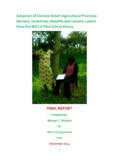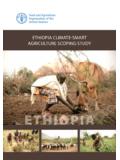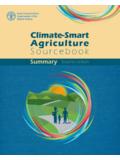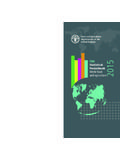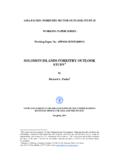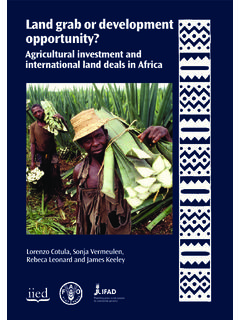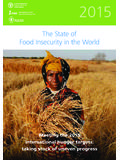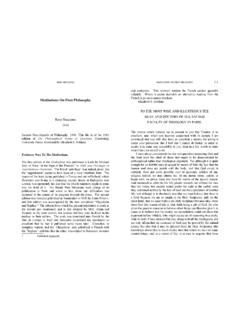Transcription of Intellectual property rights in agriculture
1 ON Intellectual property IN FOOD AND AGRICULTURED uring its four sessions, the Panel has examined with great concern the impact of theTRIPS Agreement, the system of protection sought by UPOV, and farmers the core ethical issues in food and agriculture arising from the TRIPSA greement are: the increasing risk of a transfer of important knowledge from the common domain (public goods) to the private domain, often controlled by corporations; the likely negative impact of the TRIPS Agreement on the livelihood of poor farmers; the uncertain impact on sustainable access to affordable, safe, nutritious food for consumers with limited income; the environmental impact, including the effect on property rights in agricultureIntellectual property protection has been extended in the last 25 years to a wide range ofinformation, materials and products relevant to food and agriculture .
2 The US SupremeCourt decision in Diamond v Chakrabarty influenced national legislation and case law inmany jurisdictions, opening the door for the patentability of living organisms, includingmicrobes, plants and animals and their parts and components. In addition, the TRIPSA greement and, more recently, a growing number of free trade agreements (FTAs)promoted by the United States of America, European Free Trade Association (EFTA) andthe EU have propelled the expansion of Intellectual property protection to biologicalmaterials, particularly plants. Since 1995, 40 countries have adhered to the UPOVC onvention for the Protection of New Varieties of Plants, which until then had had amembership essentially limited to developed extension of IPRs to agricultural inputs and products raises a number of foundations of Intellectual property rightsA number of arguments based on natural justice or morality have been articulated topromote an expansion of IPRs in agriculture and other areas.
3 The granting of IPRs hasbeen historically justified on three different types of grounds: Natural- rights -based proprietarianism: Under different variants (including theological and non-theological), this approach gives property interests a moral primacy. property rights , including on abstract objects, are deemed to pre-exist the state and PANEL OFEMINENTEXPERTS ONETHICS INFOOD ANDAGRICULTURE321 The TRIPS Agreement is Annex 1C of the Marrakesh Agreement Establishing the World Trade Organization, signed in Marrakesh(Morocco) on 15 April 1994 (see ).The International Union for the Protection of New Varieties of Plants (UPOV) is an intergovernmental organization withheadquarters in Geneva (Switzerland). It is based on the International Convention for the Protection of New Varieties of Plants, asrevised since its signature in Paris on 2 December 1961.
4 The objective of the Convention is the protection of new varieties ofplants by an Intellectual property right (see ).The Thirty-first Session of the FAO Conference adopted the finalized text of the International Treaty on Plant Genetic Resources forFood and agriculture (available at ). This treaty is the outcome of several years of negotiations to revise theInternational Undertaking on Plant Genetic Resources, in harmony with the Convention on Biological be simply recognized as a matter of natural justice. In some of its formulations, this theory or creed is grounded on the idea that a person who is first connected to an object with economic value is entitled to appropriate it. Distributive justice: Intellectual property rights , namely patents, have been regarded by some as a reward that the society is morally obligated to give to whoever introduces a new creation or invention.
5 Although this conception is not based on the pre-existence of rights , it considers the granting of such rights a moral imperative, regardless of the economic and social implications of such a grant. It shares with the natural rights theory a strong individualistic bias. Instrumentalism: This approach conceives IPRs as a tool that society creates to attain objectives of its own choice. In fact, IPRs emerged several centuries ago as rule-governed privileges . Although they interfered in the negative liberties of others, such privileges were justified as necessary to achieve the objectives of certain societies. Under an instrumentalist conception, knowledge is by its very nature a public good and IPRs withhold the use of information from the common pool for practical reasons, not as recognition of pre-existing rights or as a morally due properly applied instrumentalist approach should allow countries to designtheir IPR policies in accordance with their own conditions and objectives, includingin the area of agriculture .
6 However, in the last 25 years, a proprietarian approach,sometimes associated to moral reward arguments, has influenced national legislationand case law as well as international developments. some of the best examples of theinfluence of proprietarianism may be found in the area of IPRs applied to plants,animals, microbiological organisms and their parts and components, such as cellsand property rights and trade barriersA large part of the population in developing countries depends on the production andsale of agricultural products. In accordance with the World Development Report 2008, agriculture is called to play a central role in achieving the Millennium Development Goalof halving extreme poverty and hunger by 2015. Gross domestic product originating inagriculture is deemed to be about four times more effective in reducing poverty than thatoriginating outside the sector (World Bank, 2007).
7 The expansion of agricultural exports may contribute, if appropriate incomedistribution policies are in place, to reducing poverty and global income the Uruguay Round of the General Agreement on Tariffs and Trade, developedcountries demanded acceptance of the TRIPS Agreement by developing countries as aquid pro quo to reduce their barriers to agricultural trade. In recent FTAs signed betweenthe United States of America, EFTA, EU and several developing countries, the offer ofpreferential access to agricultural markets has also been the key card used to break suchcountries resistance to admit TRIPS-plus standards of IPR protection. TRIPS-plusstandards are likely to have negative impacts, inter alia, on access to medicines, educationalmaterials and technologies essential for OFEMINENTEXPERTS ONETHICS INFOOD ANDAGRICULTURE33 The Panel has also observed cases in which IPRs have been exercised by their title-holders in ways that generate inequitable outcomes.
8 Overly broad claims interpretationand abusive measures at the border may result in developing countries losing incomenecessary to reduce poverty and implement development on living formsMany national laws have recognized the possible conflict between the granting of patentsand morality. Thus, the TRIPS Agreement expressly permits WTO members to excludefrom patentability inventions, the prevention within their territory of the commercialexploitation of which is necessary to protect ordre publicor morality, including to protecthuman, animal or plant life or health or to avoid serious prejudice to the environment,provided that such exclusion is not made merely because the exploitation is prohibited bytheir law. (Article ). The TRIPS Agreement also allows countries to exclude plantsand animals from patentability (Article (b)).
9 The idea of appropriation of living forms through patents may be morally unacceptable,particularly when IPRs involve living forms found in nature and a private monopolywould impede access to a public good. In these cases, the very granting of a patent may beimmoral, even where the commercial exploitation were morally of traditional knowledgeSeveral cases of inequitable appropriation through patents of traditional and indigenousknowledge have been reported. The legal fiction that considers novel (and, hence,susceptible of being patented) unpublished traditional/indigenous knowledgegenerated and used in a foreign country has ethically unacceptable consequences. Aselaborated by the Committee on Economic, Social and Cultural rights in its GeneralComment 17 on Article 15(c) of the International Covenant on Economic, Social and CulturalRights, the moral and material interests of peoples, communities or other groups in theircollective cultural heritage constitutes a fundamental right that needs to be protected bystates (UN, 2006).
10 Test data protectionUndisclosed test data related to agrochemicals that contain new chemical entities should,under certain circumstances, be protected against unfair competition in accordance withinternational rules (Article of the TRIPS Agreement). Although these rules do notrequire the granting of exclusive rights , in some countries and, notably, in the context ofFTAs recently established with some developing countries, such test data cannot be usedor relied on for at least ten years (from the date of marketing approval) even in cases wherethe relevant product is off-patent. This form of data exclusivity restrains competitionand leads to higher prices for inputs that farmers in developing countries need, eventuallymaking them uncompetitive and forcing them out of production. Such exclusivity may inpractice amount to another impoverishing trade barrier, as morally objectionable as otherbarriers that restrict agricultural exports from poor OFEMINENTEXPERTS ONETHICS INFOOD ANDAGRICULTURE34 RecommendationsFAO should promote awareness among policy-makers and the judiciary that, by its verynature, knowledge is a public good and that IPRs are tools that society uses to promoteinnovation and creation.


